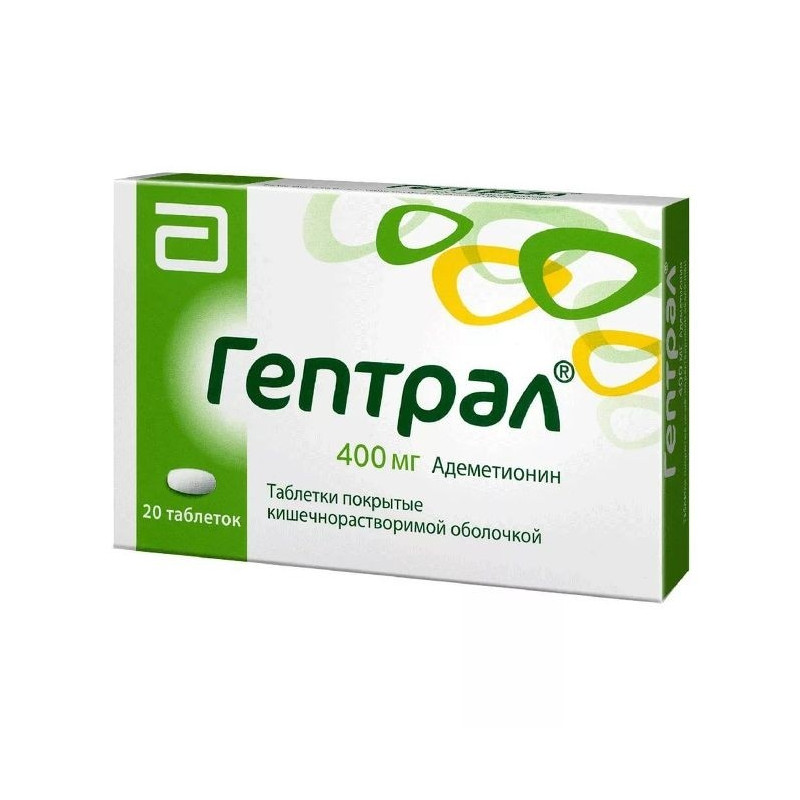



 All payments are encrypted via SSL
All payments are encrypted via SSL
 Full Refund if you haven't received your order
Full Refund if you haven't received your order
Dosage Form:Enteric-coated tablets.Indications for use:Intrahepatic cholestasis in pre-cirrhotic and cirrhotic conditions, which can be observed in the following diseases: fatty degeneration of the liver; chronic hepatitis; toxic liver damage of various etiologies, including alcohol, viral, drugs (antibiotics; anticancer, antituberculosis and antiviral drugs, tricyclic antidepressants, oral contraceptives); chronic cholecystitis without stones; cholangitis; cirrhosis of the liver; encephalopathy, incl. associated with liver failure (alcohol, etc.). Intrahepatic cholestasis in pregnant women. Symptoms of depression. Contraindications: Genetic disorders affecting the methionine cycle and / or causing homocystinuria and / or hyperhomocysteinemia (cystathionine beta synthase deficiency, a violation of vitamin B12 metabolism); hypersensitivity to any of the components of the drug; age up to 18 years (experience of medical use in children is limited). Carefully: Bipolar disorder; pregnancy (I term) and breastfeeding period; simultaneous use with selective serotonin reuptake inhibitors (SSRIs),tricyclic antidepressants (such as clomipramine), as well as herbal preparations and preparations containing tryptophan; elderly age; renal failure.Use during pregnancy and during breastfeeding:Use of the drug Heptral® in pregnant women in the first trimester and during breastfeeding is possible only if the potential benefit to the mother outweighs the possible risk to the fetus or child. Dosage and administration:Inside pills should be taken whole without chewing, preferably in the morning between meals. pills of the drug Heptral® should be removed from the blister immediately before ingestion. If pills have a color other than white to white with a yellowish tinge (due to leaks of aluminum foil), the drug Heptral® is not recommended. Initial therapy: the recommended dose is 10-25 mg / kg / day. Intrahepatic cholestasis: the dose ranges from 800 mg / day to 1600 mg / day. Depression: the dose ranges from 800 mg / day to 1600 mg / day. The duration of therapy is determined by the doctor. Therapy with Heptral® can be started with intravenous or intramuscular administration followed by the use of Heptral® in the form of pills or immediately with the use of Heptral® in the form of tablets. Elderly patients: clinical experience with the drug Heptral® did not reveal any differences in its effectiveness in elderly patients and younger patients.However, given the high likelihood of existing disorders of the liver, kidney or heart, other comorbidities, or simultaneous therapy with other drugs, elderly patients should select the dose of Heptral® with caution, starting the use of the drug from the lower limit of the dose range. Renal failure: There are limited clinical data on the use of the drug Heptral® in patients with renal insufficiency; therefore, caution is recommended when using the drug Heptral® in these patients. Hepatic insufficiency: ademethionine pharmacokinetic parameters are similar in healthy volunteers and in patients with chronic liver diseases. Children: the use of the drug Heptral® in children is contraindicated (efficacy and safety have not been established). Side effect:Insomnia; anxiety; headache; abdominal pain; nausea; diarrhea; pruritusA list of all side effects is provided in the instructions for medical use. Overdose: In case of overdose, patient monitoring and symptomatic therapy is recommended. Interaction with other drugs:There is a message about the syndrome of excess serotonin in a patient who took ademetionine and clomipramine.Special instructions:It is not recommended to take the drug at bedtime. At use of the drug Heptral® by patients with liver cirrhosis on the background of hyperazotemia, systematic monitoring of the nitrogen content in the blood is necessary.During long-term therapy, it is necessary to determine the content of urea and creatinine in the blood serum. Admethionine is not recommended for patients with bipolar disorders. There are reports of depression going into hypomania or mania in patients taking ademetionine. Patients with depression have an increased risk of suicide and other serious adverse events, so during treatment with ademetionine, such patients should be under constant medical supervision to evaluate and treat symptoms of depression. Patients should inform the physician if the symptoms of depression noted in them do not diminish or are aggravated with ademetionine therapy. There are also reports of the sudden appearance or increase of anxiety in patients taking ademetionine. In most cases, the abolition of therapy is not required, in several cases, anxiety disappeared after reducing the dose or withdrawing the drug. Since a deficiency of cyanocobalamin and folic acid can reduce the content of ademetionine in patients at risk (with anemia, liver disease, pregnancy, or the likelihood of vitamin deficiency, due to other diseases or diets, for example, in vegetarians), plasma levels of Vitamins should be monitored. If a failure is found, taking cyanocobalamin and folic acid before treatment with ademetionine or simultaneous use with ademetionine is recommended.In immunological analysis, the use of ademetionine may contribute to a false determination of the high homocysteine index in the blood. For patients taking ademetionine, it is recommended to use non-immunological methods of analysis to determine the content of homocysteine.Influence on ability to drive and work with mechanisms:Some patients may experience dizziness while taking Heptral®.
